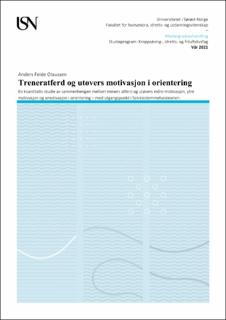| dc.contributor.advisor | Hemmestad, Liv | |
| dc.contributor.advisor | Reinboth, Michael Sæther | |
| dc.contributor.author | Olaussen, Anders Felde | |
| dc.date.accessioned | 2021-07-14T16:12:25Z | |
| dc.date.available | 2021-07-14T16:12:25Z | |
| dc.date.issued | 2021 | |
| dc.identifier | no.usn:wiseflow:2575486:42385681 | |
| dc.identifier.uri | https://hdl.handle.net/11250/2764458 | |
| dc.description.abstract | Denne studien undersøker forholdet mellom treneratferd og utøvers motivasjon i orientering. Overordnet problemstilling er: I hvilken grad er det en sammenheng mellom treners atferd og motivasjon hos utøvere i orientering? Det ble benyttet kvantitativ metode og ved hjelp av en spørreundersøkelse ble det samlet inn 88 svar fra utøvere i orientering. Det ble funnet støtte for selvbestemmelsesteorien der utøvers grad av indre motivasjon og ytre motivasjon varierer med i hvilken grad de grunnleggende psykologiske behovene for autonomi, kompetanse og tilhørighet blir tilfredsstilt. Amotivasjon eksisterer i praksis ikke i denne studien. Trenere i orientering bør legge til rette for tilfredstillelse av utøvernes grunnleggende psykologiske behov for å bidra til økt indre og selvbestemt motivasjon. De bør være kontekstfølsomme og ta hensyn til hvilken type utøver de trener. Det kan se ut som det er spesielt viktig å gi spesifikke instruksjoner til hver enkelt utøver, inkludere utøvere i beslutningsprosesser, samt å delta aktivt i sosial virksomhet. Videre forskning bør skille mellom utøvernes nivå og alder, samt treffe et bredere utvalg og se på muligheten for å skille mellom konkurranse- og treningssituasjoner. | |
| dc.description.abstract | This study investigates the relationship between coaching leadership style and athletes’ motivation in orienteering. The overall issue is: In which degree is there a relationship between perceived coaching behaviours and athletes’ motivation in orienteering? Quantitative methods were used and with the help of a questionnaire, 88 answers were collected from orienteering athletes. It was found support for self-determination theory where the basic psychological needs for autonomy, competence and relatedness mediated the effect of perceived coaching behaviours and athletes’ intrinsic motivation and extrinsic motivation. Amotivation does not exist in this study. Too promote intrinsic motivation and self-determined extrinsic motivation, orienteering coaches should facilitate the satisfaction of the athletes’ basic psychological needs. They should be context sensitive and pay attention to the type of athlete they are coaching. It may seem that there is especially important to give specific instructions to each athlete, include the athletes in decision-making processes, as well as to actively participate in social activities. Further research should distinguish between the athletes' level and age, as well as make a wider selection and look at the possibility of distinguishing between competition situations and training situations. | |
| dc.language | nob | |
| dc.publisher | University of South-Eastern Norway | |
| dc.title | Treneratferd og utøvers motivasjon i orientering | |
| dc.type | Master thesis | |
